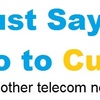Pay TV is in turmoil due to cord cutting. Retail is in upheaval due to changing buying habits as well as a transition in how people spend free time.
"The U.S. (and the world) is in the midst of a sea change in how we spend our leisure time. Young people are less inclined to indulge in America's favorite pastime: zoning out in front of the TV. On average, people ages 18 to 24 spend half as much time watching live and recorded television as 35-to-49-year-old Americans, according to Nielsen...... Young people are definitely watching video, but it's more likely something from YouTube or a friend's Snapchat story on their phone than the episode of "Grey's Anatomy" their parents are watching on the living room TV."
"All told, traditional cable, satellite and telco pay-TV services (not counting OTT offerings) lost a net of about 1.64 million video subscribers last year as compared to a loss of some 980,000 in 2015." [telecomp]
Telco TV was too late to the party. It cost the telcos billions of CAPEX dollars to find out that cord cutting was real and OTT video - Netflix, Hulu, YouTube, Amazon Prime, Sling TV -was going to be the winner.
The economics look upside down. Bear with me here. Right now the cable operators are winning the war for both broadband and voice. In many areas, cable is now the incumbent voice provider.
With triple-play the operator sees ARPU of about $161. If the customer only buys broadband - which is happening more and more - the ARPU drops to $65. Never mind the tax implications for federal, state ad local government (they are screwed either way), just consider what this does for revenue numbers.
The ripple effects are already being seen. ESPN, the Disney owned sports channel, is in a tail spin with a loss of about $500M in revenue per year from cord cutters. Cable channels are either being closed by the content owners or re-named and re-tooled. There aren't 500 useless channels; there are 1M with all of the streams and social media. This will be a real problem for content creators, actors, writers and advertisers.
Windstream, CenturyLink and other RLECs (Frontier, Fairpoint, TDS, et al) have been working hard to get the percentage of revenue from residential/consumers from the average of 75% to a 50/50 mix with business services. Windstream bought EarthLink; CenturyLink bought Level3. TDS bought managed IT firms and data centers. Fairpoint sold itself to Consolidated Comms. Frontier keeps buying states from Verizon and AT&T; consequently, their mix is still heavily consumer.
Everyone has a revenue problem. Pricing pressure has squeezed every operator. It will get worse. Millennials don't want to pay a cable company. They have a huge cellular bill and student loans totaling $1 Trillion. Couple that with stagnant wages and a bleak jobs future that is getting darker with all the investment in robotics and AI, the economic outlook doesn't look bright. As I have asked before: if wages are stagnant, how does someone continue to keep the economy spinning with buying?
I hope, unlike cord cutting, that operators don't have their head in the sand on this issue.
With 5G trials rolling out, will the next generation - who aren't buying homes and aren't buying cars - buy wireline broadband? A few analysts say Unlikely. I already know several twenty-somethings and thirty-somethings that do NOT have terrestrial / wireline broadband. It is all smartphone and hotspot at home.
What does that do to the economics of the network? Business revenue will become even more important. And as revenues decrease, price increases will result, which will mean less subscribers.
Planet Networks believes that rural and under-served areas will still be on wireline because 4G and 5G will not get there any time soon. That may be true - so RLECs will be happy - but the majority (80%) of the population lives in urban areas.
In other nations, cellular (including fixed cellular) are sometimes the only available network. It is cheaper to put up towers and radios than to dig up streets and sidewalks to lay fiber.













